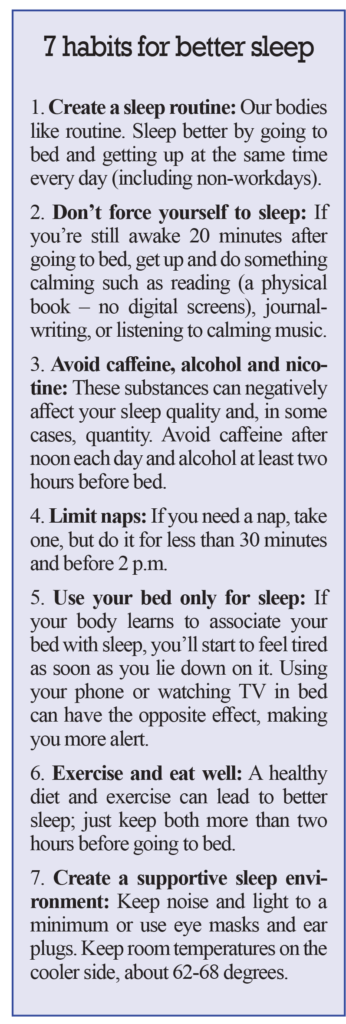
If you said you need to sleep less and exercise more to lose weight, you’d be forgiven. We’re bombarded daily with messages that tell us to move more, push through pain, and get more done, suggesting that losing weight is all about sacrifice and working hard.
But Coastline’s Stephanie Boulay, a registered dietitian, wants people to know that sleep, as in getting enough good quality consistent sleep, is just as important as any exercise routine or thoughtful diet to being healthier and losing weight.
“Why would a dietitian talk about sleep?” Boulay asked her Pound by Pound audience at the Dartmouth Council on Aging in April. “We spend one-third of our lives doing it, but we don’t really talk about it.”
Good sleep affects our hormone levels, Boulay said, influencing how hungry we feel, and even what food cravings we experience. It has a direct impact on our weight.
“When you don’t sleep well, your hunger hormone goes way up, so your hunger cravings increase,” said Boulay. “People who get six or fewer hours of sleep a day actually eat 300 calories more a day.”
Sleep does much more than this too. Research has shown that those who don’t get regular quality sleep will experience decreased productivity, higher risk for heart disease and cancer, and even decreased likeability, Boulay said.
Insufficient sleep is also associated with brain disease and as much as 15 percent of Alzheimer’s cases can be linked to poor sleep, she said.
Adults need between seven and nine hours of sleep each night and older adults need nearly that much, between eight and nine hours, according to Boulay.
But quantity alone doesn’t produce the best results, she said.
The body cycles through four stages of sleep each night, multiple times each, moving from lighter to deeper sleep conditions. The last two stages including REM, rapid eye movement, sleep are especially important to physical and emotional restoration.
What time a person goes to sleep is also important, Boulay said, noting that going to sleep about 10 p.m. is recommended. Shift workers who work overnight have been given hazard pay, she said, because their schedules and daytime sleep times have been shown to lower life span and increase the risk of cancer.
So, how does someone know if they’re getting enough quality sleep?
One way is to take stock of how you feel when you wake up, Boulay said. If you feel rested, energized, and ready to face the day, then you’re doing something right.
If you’re still feeling tired, you’re not alone. In the U.S., as much as 75 percent of people wake up not feeling rested, according to Boulay.
With all these reasons to focus on sleeping better, Boulay advises starting small and building up.
Pick one of the recommended sleep habits and work on that for a week, she said. Notice how it affects your sleep quality and how you feel. Then choose another and do the same.
See the list of positive sleep habits at right to begin.


Recent Comments